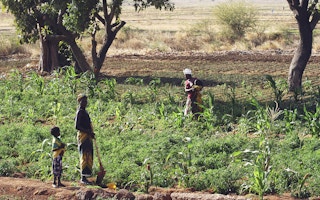On the first World Food Day in 1945, people around the world celebrated the creation of the United Nations Food and Agriculture Organization and the launch of the first coordinated global action to combat hunger. This year, on the 70th World Food Day, countries are mobilizing behind the Sustainable Development Goals – one of which calls for the elimination of hunger and malnutrition by 2030, together with the creation of a more resilient and sustainable food system. Can it be done?
To continue reading, subscribe to Eco‑Business.
There's something for everyone. We offer a range of subscription plans.
- Access our stories and receive our Insights Weekly newsletter with the free EB Member plan.
- Unlock unlimited access to our content and archive with EB Circle.
- Publish your content with EB Premium.
With the world population growing rapidly (to an estimated 8.5 billion by 2030), the impact of climate change becoming increasingly apparent, and the amount of arable land dwindling, there can be no denying that achieving this goal will be a daunting challenge. But for Africa, which boasts 60 per cent of the world’s arable land and climates conducive to a tremendous diversity of crops, striving to do so represents a remarkable opportunity to ensure food security for Africans (one in four is undernourished) and boost its economy by becoming a major food exporter.
Though many African economies have experienced rapid growth in recent years, the agricultural sector has remained stagnant. Indeed, African agriculture is still dominated by small-scale farmers who lack access to productivity-boosting technology, focus mainly on a narrow range of products, and remain poorly linked to markets, manufacturing, and the broader economy. Beyond undermining food security – Africa remains a major food importer – low agricultural productivity contributes to the persistence of rural poverty, even as a middle class emerges in many of Africa’s cities.
Africa can and should be the world’s breadbasket. But to realize this vision – and to do it in an environmentally sustainable way – its agricultural sector must undergo a genuine transformation that entails higher capital investment, significant crop diversification, and improved linkages to burgeoning urban consumer markets. Moreover, Africa must start manufacturing more value-added food products for both internal consumption and export, especially to countries like India and China, where demand is growing.
From Europe and North America to East Asia and Latin America, agricultural advances have proved to be key precursors of industrial development and gains in living standards. Africa has the added benefit of technologies that other regions lacked at this stage of their agricultural development, from cost-competitive off-grid solar power to mechanisms for mapping soil characteristics, regulating water use, and ensuring farmers’ access to accurate price information.
And innovation is already happening. Rwanda, for example, is working to link agriculture support with broader services like electricity and education. And the country’s farming communities are pioneering participatory decision-making structures for agricultural planning and conflict-resolution mechanisms to settle disputes among growers.
“
Climate-change considerations – including the expected costs of mitigation and adaptation – must be central to the process of upgrading agriculture, including the relevant infrastructure.
To bolster agricultural innovation and modernization, governments must ensure that farmers have secure titles to their land, and thus an incentive to make the needed investments. The challenge lies in the fact that, in many parts of Africa, land is communally owned, with almost everyone in a village having traditional rights to some farming land – a system that has helped to prevent landlessness and destitution in rural areas. Given this, reforms to make land tenure more compatible with modern commercial agriculture must be sensitive to local traditions and respect the ownership rights of communities and traditional smallholders.
Of course, agricultural development can have serious economy-wide pitfalls, which must be navigated carefully. For example, as technology-driven productivity gains reduce the number of workers needed on farms, strategies to boost employment in other parts of the value chain and to manage migration to cities become even more essential.
With Africa’s rural population already largely underemployed, there is no time to waste in implementing such strategies. Fortunately, Africa’s large population of increasingly well-educated young people, who are largely uninterested in the backbreaking work of subsistence farming, is well suited to fill the higher value-added jobs that emerge in the agricultural sector and beyond.
Another potential pitfall of agricultural development is environmental damage, including land degradation, soil nutrient mining, excessive water use, and water pollution. Here, again, Africa can benefit from experience and know-how that other regions could not access at a similar stage in their agricultural development. By drawing on other countries’ best practices – and avoiding their mistakes – Africa can develop an environmentally sustainable agricultural system that fits African conditions.
Such a system must place a high priority on protecting biodiversity and prevent the emergence of monocultures across the continent, which is home to some of the world’s richest ecosystems. Climate-change considerations – including the expected costs of mitigation and adaptation – must be central to the process of upgrading agriculture, including the relevant infrastructure.
Ultimately, each country must chart its own course toward agricultural development. But cooperation – even just to exchange ideas and emulate best practices – can help the process considerably. That is why, next March, the African Transformation Forum in Kigali will convene leading figures from African governments, business, academia, and civil society to discuss practical next steps toward agricultural transformation in Africa, and the broader push to build globally competitive economies.
Africa’s agricultural transformation will be a long and complex process. But it has the potential to ensure regional food security, promote broader economic development, and ultimately help to feed the world. We are confident that African leaders will rise to the challenge.
Paul Kagame is President of the Republic of Rwanda. K.Y. Amoako is the founder of the African Center for Economic Transformation, a Ghana-based think tank.
Copyright: Project Syndicate, 2015.
www.project-syndicate.org











